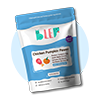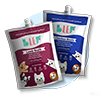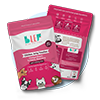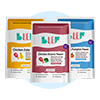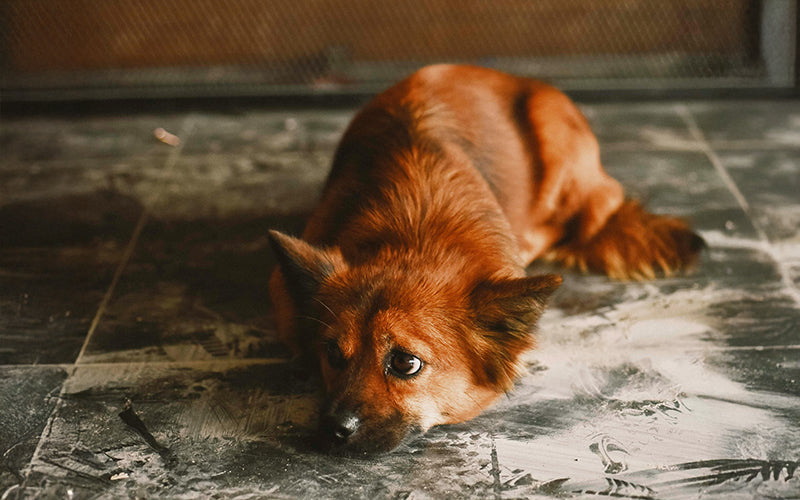Being first-time pet parents can be daunting: making the house pup-friendly, getting the right kind of food, rearranging your schedule to take care of your bundle of joy, and so many other new experiences. However, there’s something that confuses most new pet parents — what are the vaccines that puppies need and when to get them? In this blog, we give you a complete run-down of everything you need to know about your puppy’s vaccination schedule.
Your Puppy’s First Vet Visit: What to Expect?
When you bring your puppy home, it is important to schedule a vet visit as soon as possible to get an understanding of their health from day 1. Usually, puppies will need vet visits every 3–4 weeks once they’re 6–8 weeks old. Your first visit to the vet will include a number of routine checks. Here’s what you can expect:
-
Weight check, to understand whether they’re developing as expected at that age.
-
Complete check of their physical attributes, such as eyes, ears, teeth, gums, nose, feet, joints, nails, skin, coat, and genitalia.
-
Lung and heart check, to rule out any genetic anomalies.
-
Check for movement and reflexes to determine neurological health.
-
Temperament check, to figure out the emotional and psychological condition of your pup.
-
Organ check, in which the vet will palpate the lymph nodes and abdominal organs to see if there are any unusual reactions.
-
Collection of stool and blood samples (blood is usually taken only from puppies above 6 months).
At the end of these checks, the vet will likely discuss topics, such as grooming needs, nutritional needs, physical activity requirements, common parasite prevention, pet safety, socialisation needs, common diseases to look out for, and dental health maintenance, as well as your puppy’s vaccination schedule. Here, veterinary clinics usually encourage new pet parents to ask as many questions as they want so they can provide the best care to their puppy.

Your Puppy’s Vaccination Schedule
Vaccinations protect your puppy against the most contagious, dangerous, and common diseases. Some of these are absolutely non-negotiable, while others may be optional, depending on your puppy’s environment and lifestyle. Here are some diseases that vaccines protect against:
Essential:
-
Rabies: Rabies is a life-threatening disease in both dogs and humans. It is caused by a virus that attacks the central nervous system and is fatal once symptoms appear. There can be behavioural changes, such as aggression, fear, etc., as well as physical symptoms like difficulty swallowing, excessive drooling or foaming at the mouth, and progressive paralysis. Dogs may even become sensitive to light, sound, and touch. The rabies vaccine is the only armour against rabies, as there are no cures.
Puppy Vaccination Schedule for Rabies:
1st Dose: 12-14 Weeks
2nd Dose: 16-18 Weeks
Booster: Annually once your puppy turns 1
-
Canine Distemper: Another viral disease, canine distemper is spread through airborne exposure, meaning coughing, sneezing, shared food, water bowls, or toys, so it is highly contagious. The disease mainly attacks the respiratory, gastrointestinal, and nervous systems. Prevention via vaccines, again, is the only way to deal with Canine Distemper because there is no cure. Symptoms include fever, coughing, discharge from eyes and nose, vomiting, diarrhoea, hardening of footpad, seizures, twitching, paralysis, and death. In very rare cases, if a dog survives the symptoms, their immune system may be able to fight off the disease. The vaccine against this disease is a combo vaccine called DHPPiL.
Puppy Vaccination Schedule for Canine Distemper:
1st Dose: 6-7 Weeks
Booster: 9-10 Weeks
Booster: 12-14 Weeks
Booster: Annually once your puppy turns 1
-
Canine Parvovirus: This virus can attack dogs at any age, but puppies that are less than four months of age are the most vulnerable to it. Extremely contagious, Canine Parvovirus affects the gastrointestinal system and shows symptoms, such as vomiting, bloody diarrhoea, rapid dehydration, and, ultimately, death. There is no cure for the disease except symptom control. The vaccine against this disease is a combo vaccine called DHPPiL.
Puppy Vaccination Schedule for Canine Parvovirus:
1st Dose: 6-7 Weeks
Booster: 9-10 Weeks
Booster: 12-14 Weeks
Booster: Annually once your puppy turns 1
-
Canine Hepatitis: Caused by the Canine Adenovirus type 1 (CAV-1) virus, this disease affects the liver, kidneys, spleen, lungs, and eyes. There can be a mild as well as a severe form of infection. In the mild form, symptoms are fever and congestion of the nose. In the severe form, Canine Hepatitis causes vomiting, jaundice, stomach enlargement, and pain around the liver. Only symptoms can be managed for this disease, as there is no cure. The vaccine against this disease is a combo vaccine called DHPPiL.
Puppy Vaccination Schedule for Canine Hepatitis:
1st Dose: 6-7 Weeks
Booster: 9-10 Weeks
Booster: 12-14 Weeks
Booster: Annually once your puppy turns 1
-
Leptospirosis: This bacterial disease is transmitted through infected rodents, contaminated water, or soil, and affects a dog’s kidneys and liver. It’s also a zoonotic disease, so it can spread from animals to humans. While sometimes the infected dog may show no symptoms at all, some may show signs like fever, vomiting, stomach pain, diarrhoea, loss of appetite, severe weakness and lethargy, stiffness, jaundice, muscle pain, reproductive issues, and kidney failure. Antibiotics are crucial. The vaccine against this disease is a combo vaccine called DHPPiL.
Puppy Vaccination Schedule for Leptospirosis:
1st Dose: 6-7 Weeks
Booster: 9-10 Weeks
Booster: 12-14 Weeks
Booster: Annually once your puppy turns 1

Optional:
-
Kennel Cough: This is a disease of the upper respiratory tract usually caused by the highly-contagious bacteria Bordetella bronchiseptica. It is often accompanied by multiple infections simultaneously. The infection can be mild, causing harsh, dry coughing. In severe cases, it may also cause retching, gagging, and loss of appetite. As the name suggests, it can spread quickly among dogs in a kennel or in any setting where they are close together. If you keep your dogs in dog boarding frequently or take them into social settings with many dogs often, it is best to get this vaccine.
Puppy Vaccination Schedule for Kennel Cough:
1st Dose: 6-8 Weeks
Booster: 10-12 Weeks
Booster: 16-18 Weeks
Booster: Annually once your puppy turns 1
-
Canine Coronavirus: Canine Coronavirus is usually not fatal; however, sometimes it can lead to more serious problems like viral hemorrhagic disease. Usual symptoms are gastrointestinal issues like loss of appetite, vomiting, and diarrhoea. Sometimes, the respiratory tract may also be affected.
Puppy Vaccination Schedule for Canine Coronavirus:
1st Dose: 1 year
Booster: Annually once your puppy turns 1
-
Lyme Disease: Lyme Disease is caused by a type of bacteria called spirochete that usually gets to dogs via tick bites. Symptoms include limping, swelling of lymph nodes, fever, and loss of appetite. Lyme Disease can affect the heart, kidneys, joints, and other parts of the body, even reaching the brain if treatment is delayed. Antibiotics are crucial once infected, although there may be relapses.
Puppy Vaccination Schedule for Lyme Disease:
1st Dose: 10-12 Weeks
Booster: 16-18 Weeks
Booster: Annually once your puppy turns 1
-
Canine Parainfluenza: This is a viral disease that is often part of the Kennel Cough infection. It is caused by the Canine Parainfluenza Virus (CPIV). It is highly contagious and can cause hacking cough, nasal discharge, fever, and lethargy. The vaccine against this disease is a combo vaccine called DHPPiL.
Puppy Vaccination Schedule for Canine Parainfluenza:
1st Dose: 6-7 Weeks
Booster: 9-10 Weeks
Booster: 12-14 Weeks
Booster: Annually once your puppy turns 1
Apart from these essential and optional vaccinations, another treatment to keep in mind for pups is proper and regular deworming. This will help pups absorb the proper nutrients from their food as well as give full efficacy to the vaccines. Deworming usually starts when your pup is 2 weeks old and continues every two weeks till they’re 12 weeks old. This procedure is good for their growth and development. Once your pup is 3 months old, get them dewormed once every month till they’re 6 months old. After 6 months of age, deworming should be done every 3 to 6 months.
How to Prepare for Your Puppy’s First Vaccination?
-
Make sure to do your research before finalising your vet. If you have a comparatively uncommon breed, see if they have handled such pups before. Have a detailed conversation with your vet and ask as many questions as you can.
-
Schedule the first consultation at least a week before you start the vaccination cycle. This way, your pup will get a full health check-up before any vaccine is given to them, and they will also be able to familiarise themselves with the vet.
-
Vaccinations can be stressful to your pet. Check with the vet to see if you can bring their favourite toy, treat, or other items that bring them comfort. Stay with your pup when they’re getting the vaccinations. It is usually allowed by the vet.
-
While going to the vet and coming back, give your pups some treats and positive reinforcement. It is good to try and associate a visit to the vet with positive experiences. BLEP’s chicken jerky treats are 100% natural and preservative-free, and can be a great snack promoting positive reinforcement.
There may be some side effects of the vaccines, but that’s absolutely natural. Symptoms may include slight fever, lethargy, or mild discomfort at the site of injection; however, they should resolve themselves within 24 hours. If symptoms don’t go away after that, it is best to consult your vet.

Looking to explore more healthy treats and care tips for your furry friend? Check out our other guides like Why Do Dogs Lick You?, How Can Zero Preservative Natural Dog Food Have a 12-month Shelf Life?, Common Skin Problems in Dogs: Causes, Symptoms, and Treatments, What Are Kibbles for Dogs and How Are They Harmful?, Can Dogs Eat Apples?, Can Dogs Eat Blueberries?, Dog Food for Weight Loss, Raw v/s cooked meat for dogs, Home Remedies to cure tick fever, Finding Good Dog Food in India, How many times should I feed my dog?, Things you should do to keep your pet healthy, Types of Dog Food, and How Prebiotics and Probiotics can improve your dog's digestion. Each guide is designed to help you make better food choices for your dog because the right diet is what gives you a happy and thriving pup.
Resources:
https://www.akc.org/expert-advice/health/puppy-shots-complete-guide/
https://petyaari.com/dog-vaccinations-in-india-schedule-and-costs/#core-vs-non-core-dog-vaccinations
https://chdanimalhusbandry.gov.in/vaccination.aspx
https://www.purina.in/articles/dogs/puppy/health/puppy-vaccinations
https://www.dogseechew.in/blog/a-to-z-guide-for-dog-vaccination
https://in.virbac.com/home/every-advice/pagecontent/dog-vaccination-guide.html
https://supertails.com/blogs/posts/dog-puppy-vaccination-your-guide-to-dog-vaccination-schedule
https://www.broadstreetvet.com/site/blog/2023/03/15/puppys-first-vet-visit-checklist--what-to-expect
https://www.petmd.com/dog/general-health/how-to-prepare-for-puppy-first-vet-exam
https://headsupfortails.com/blogs/blog/puppy-health-guide-vet-appointment-vaccination-schedule

